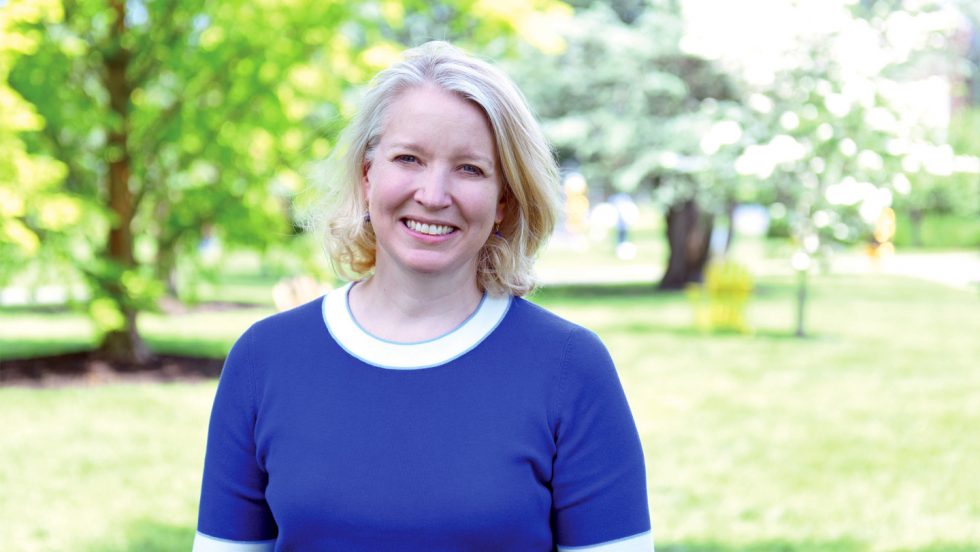
They're called “undeclared students." They're the ones who come to Adelphi University not knowing what they will major in.
Most students do know their major before they matriculate—undeclared students are less than 10 percent of the class of 2025, out of more than 1,300. But that’s still well over 100 students. If “undeclared” was a department, it would be one of the most popular, right behind nursing, psychology and biology.
Undeclared students eventually find their way to a major by the time they need to declare one, in the second semester sophomore year, said Andrea Ward, PhD, associate dean for student success and strategic initiatives. But she wants to help them on that journey.
“Students who come in without a major can feel a bit isolated, and like they don’t really belong,” she said. “What I want them to realize is that even if they haven’t chosen a major, they are important members of the community here at Adelphi.”
Dr. Ward used to chair the Department of Biology, where she was deeply involved in the advising process. She understands how departments help new majors navigate the University’s programs, get to know their professors and integrate into the community.
She knew that process can be murkier for undeclared students, however, and she wanted to address that. When she became associate dean last January, she got her chance.
Dr. Ward began rolling out some of her ideas in a pilot program for undeclared majors last fall. To begin with, she decided to reach out to them personally. Adelphi students are assigned advisers from the Office of Academic Services and Retention who help them select their classes. Dr. Ward speaks with them on a more personal note.
“I think it’s nice to hear from another person who says, ‘Hey, we’re really excited that you’re here. And I want to make sure that you are going on the path that is best going to help you get to choosing that major or thinking about that future career path.'”
Her main focus is developing targeted academic advising and creating introductory workshops to the University’s resources that are designed to help students settle on a major.
Academic Guidance
Dr. Ward and her colleagues highlight some of the unique classes at Adelphi that might help them figure out their paths, she said. Among the guidance she gives them: Take an Adelphi 360 course.
Each course focuses on a particular general topic and is taught by faculty across the University. Water was the theme of one class, taught by the chair of the Department of Art and Art History. Other topics have included race and food.
“The idea of the seminar is to take what seems like a simple topic, and you look at it from a multidisciplinary lens, bringing in faculty from around the University to talk about this topic,” Dr. Ward said. “So for an undeclared student, this is a great opportunity to meet and see faculty from around the University. We really wanted to highlight this as a good class choice and make it an option for all undeclared students to take one of these seminars.”
Workshops and Events
In addition to building community, Dr. Ward has set up meetings designed to feature campus resources that can help undeclared students explore their interests. She found the topics last summer by asking the undeclared students what questions they had.
These resources are presented in a series of workshops, which she co-leads with the Center for Student and Community Engagement. The most popular, with the Office of Academic Services and Retention, teaches students how to register for classes, including what to think about before meeting with their adviser.
Other presentations are made by the Center for Career and Professional Development, Center for International Education, Innovation Center, and the Learning and Writing Centers.
Dr. Ward also hopes to bring back the Majors Fair, which has been on hiatus the last couple of years because of the pandemic. “This would be targeted to our undeclared students from the College of Arts and Sciences and our General Studies program, as well as more generally to the community at large,” she said. “It will be a big event to give students the opportunity to talk to faculty members from any major.”
She’s thinking of these overall efforts as a kind of pilot program, Dr. Ward said. She plans to survey the students at the end of the year so she can see what worked and, she hopes, turn it into a formal program. The anecdotal feedback so far has been very positive.
“It’s really important to do things that are going to help the students be more successful in their coursework, in their overall academic career,” she said. “We want them to be able to use their first few semesters to see what trajectory they would like to go in.”